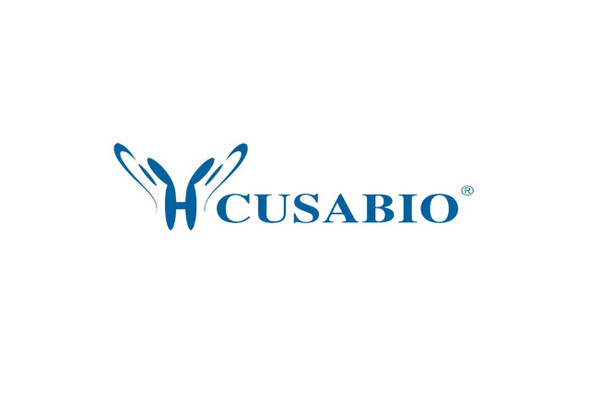Cusabio Active Proteins
Recombinant Human Pro-neuregulin-1, membrane-bound isoform protein (NRG1), partial (Active) | CSB-AP002861HU
- SKU:
- CSB-AP002861HU
- Availability:
- 5 to 10 Working Days
Description
Recombinant Human Pro-neuregulin-1, membrane-bound isoform protein (NRG1) ,partial (Active) | CSB-AP002861HU | Cusabio
Protein Description: Partial of Isoform 12
Alternative Name (s) : Pro-NRG1, ARIA, Breast cancer cell differentiation factor p45, Glial growth factor, Heregulin
Gene Names: NRG1,GGF,HGL,HRGA,NDF,SMDF
Research Areas: Neuroscience
Species: Homo sapiens (Human)
Source: E.Coli
Tag Info: Tag-Free
Expression Region: 177-237aa
Sequence Info: SHLVKCAEKE KTFCVNGGEC FMVKDLSNPS RYLCKCPNEF TGDRCQNYVM ASFYKAEELY Q
Biological Activity: Fully biologically active when compared to standard. The ED50 as determined by a cell proliferation assay using serum free human MCF-7 cells is less than 50 ng/ml, corresponding to a specific activity of > 2.0 × 104 IU/mg.
MW: 7.0 kDa
Purity: >96% as determined by SDS-PAGE and HPLC.
Endotoxin: Less than 1.0 EU/µg as determined by LAL method.
Relevance: Direct ligand for ERBB3 and ERBB4 tyrosine kinase receptors. Concomitantly recruits ERBB1 and ERBB2 coreceptors, resulting in ligand-stimulated tyrosine phosphorylation and activation of the ERBB receptors. The multiple isoforms perform diverse functions such as inducing growth and differentiation of epithelial, glial, neuronal, and skeletal muscle cells; inducing expression of acetylcholine receptor in synaptic vesicles during the formation of the neuromuscular junction; stimulating lobuloalveolar budding and milk production in the mammary gland and inducing differentiation of mammary tumor cells; stimulating Schwann cell proliferation; implication in the development of the myocardium such as trabeculation of the developing heart. Isoform 10 may play a role in motor and sensory neuron development. {ECO:0000269|PubMed:1348215, ECO:0000269|PubMed:7902537}.
PubMed ID: 1350381; 7509448; 8096067; 7782315; 14702039; 16421571; 9333014; 12145742; 17565985; 15489334; 7689552; 1348215; 7902537; 10523851; 10597312; 10867024; 8062828; 8639490
Notes: Repeated freezing and thawing is not recommended. Store working aliquots at 4℃ for up to one week.
Function: Direct ligand for ERBB3 and ERBB4 tyrosine kinase receptors. Concomitantly recruits ERBB1 and ERBB2 coreceptors, resulting in ligand-stimulated tyrosine phosphorylation and activation of the ERBB receptors. The multiple isoforms perform diverse functions such as inducing growth and differentiation of epithelial, glial, neuronal, and skeletal muscle cells; inducing expression of acetylcholine receptor in synaptic vesicles during the formation of the neuromuscular junction; stimulating lobuloalveolar budding and milk production in the mammary gland and inducing differentiation of mammary tumor cells; stimulating Schwann cell proliferation; implication in the development of the myocardium such as trabeculation of the developing heart. Isoform 10 may play a role in motor and sensory neuron development. Binds to ERBB4
Involvement in disease: A chromosomal aberration involving NRG1 produces gamma-heregulin. Translocation t (8;11) with TENM4. The translocation fuses the 5'-end of TENM4 to NRG1 (isoform 8) . The product of this translocation was first thought to be an alternatively spliced isoform. Gamma-heregulin is a soluble activating ligand for the ERBB2-ERBB3 receptor complex and acts as an autocrine growth factor in a specific breast cancer cell line (MDA-MB-175) . Not detected in breast carcinoma samples, including ductal, lobular, medullary, and mucinous histological types, neither in other breast cancer cell lines.
Subcellular Location: Pro-neuregulin-1, membrane-bound isoform: Cell membrane, Single-pass type I membrane protein, Note=Does not seem to be active, SUBCELLULAR LOCATION: Neuregulin-1: Secreted, SUBCELLULAR LOCATION: Isoform 8: Nucleus, Note=May be nuclear, SUBCELLULAR LOCATION: Isoform 9: Secreted, Note=Has a signal peptide, SUBCELLULAR LOCATION: Isoform 10: Membrane, Single-pass type I membrane protein
Protein Families: Neuregulin family
Tissue Specificity: Type I isoforms are the predominant forms expressed in the endocardium. Isoform alpha is expressed in breast, ovary, testis, prostate, heart, skeletal muscle, lung, placenta liver, kidney, salivary gland, small intestine and brain, but not in uterus, stomach, pancreas, and spleen. Isoform 3 is the predominant form in mesenchymal cells and in non-neuronal organs, whereas isoform 6 is the major neuronal form. Isoform 8 is expressed in spinal cord and brain. Isoform 9 is the major form in skeletal muscle cells; in the nervous system it is expressed in spinal cord and brain. Also detected in adult heart, placenta, lung, liver, kidney, and pancreas. Isoform 10 is expressed in nervous system: spinal cord motor neurons, dorsal root ganglion neurons, and brain. Predominant isoform expressed in sensory and motor neurons. Not detected in adult heart, placenta, lung, liver, skeletal muscle, kidney, and pancreas. Not expressed in fetal lung, liver and kidney. Type IV isoforms are brain-specific.
Paythway: ErbBsignalingpathway
Form: Lyophilized powder
Buffer: Lyophilized from a 0.2 µm filtered PBS, pH 7.4
Reconstitution: We recommend that this vial be briefly centrifuged prior to opening to bring the contents to the bottom. Please reconstitute protein in deionized sterile water to a concentration of 0.1-1.0 mg/mL.We recommend to add 5-50% of glycerol (final concentration) and aliquot for long-term storage at -20℃/-80℃. Our default final concentration of glycerol is 50%. Customers could use it as reference.
Uniprot ID: Q02297
Uniprot Entry Name: NRG1_HUMAN
HGNC Database Link: HGNC
UniGene Database Link: UniGene
KEGG Database Link: KEGG
STRING Database Link: STRING
OMIM Database Link: OMIM









